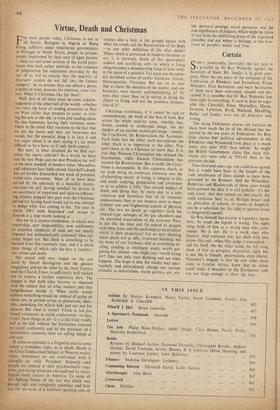Curtain
SApt_v, predictably, inevitably the last note is a grumble by Sir Roy Welensky against the Secretary of State. Mr. Sandys is in good com- pany. Over the ten years of the existence of the Federation of Rhodesia and Nyasaland, Prime Ministers, First Secretaries and mere Secretaries of State have been welcomed, abused and dis- carded. It is possible that Sir Roy Welensky has been right in everything. It must at least he argu- able that Churchill, Eden, Macmillan, Home, Swinton, Lyttelton, Boyd, Macleod, Maudling, Butler and Sandys were not all dishonest and wrong.
The dying Federation churns out statistics to show how much the lot of the African has im- proved in the ten years of Federation. Sir Roy even claims that 'political advancement in the Rhodesias and Nyasaland look place at a much faster rate after 1953 than before.' So might the British Government claim that more tele- vision sets were sold in 1953-63 than in the previous decade.
Two thousand years ago one could have agreed that it would have been to the benefit of the rude inhabitants of these islands to have been governed by the Romans. And the Welenskys, Robertses and Blackwoods of those years would have scorned the idea. It is still pathetic—it's the only word--that they cannot see that exactly the same emotions beat in an African breast and no provision of schools or ■roads. or hospitals can be a substitute for the right to govern (even to misgovern) oneself.
Sir Roy himself has become -a legendary figure here. As usual the legend is wrong. The right wing think of him as a strong man who com- mands. He is not. He is a weak man who blusters. And everyone who has dealt with him knows this and—when they judge it convenient— call his bluff. On the other hand, the left wing think of him as arrogant, dictatorial, rigid. He is not. He is friendly, paternalistic, even liberal. Welensky's tragedy is that he saw what must conic in Central Africa, knew that he alone could make it bearable to the Europeans, and was not large enough to show the way.






























 Previous page
Previous page